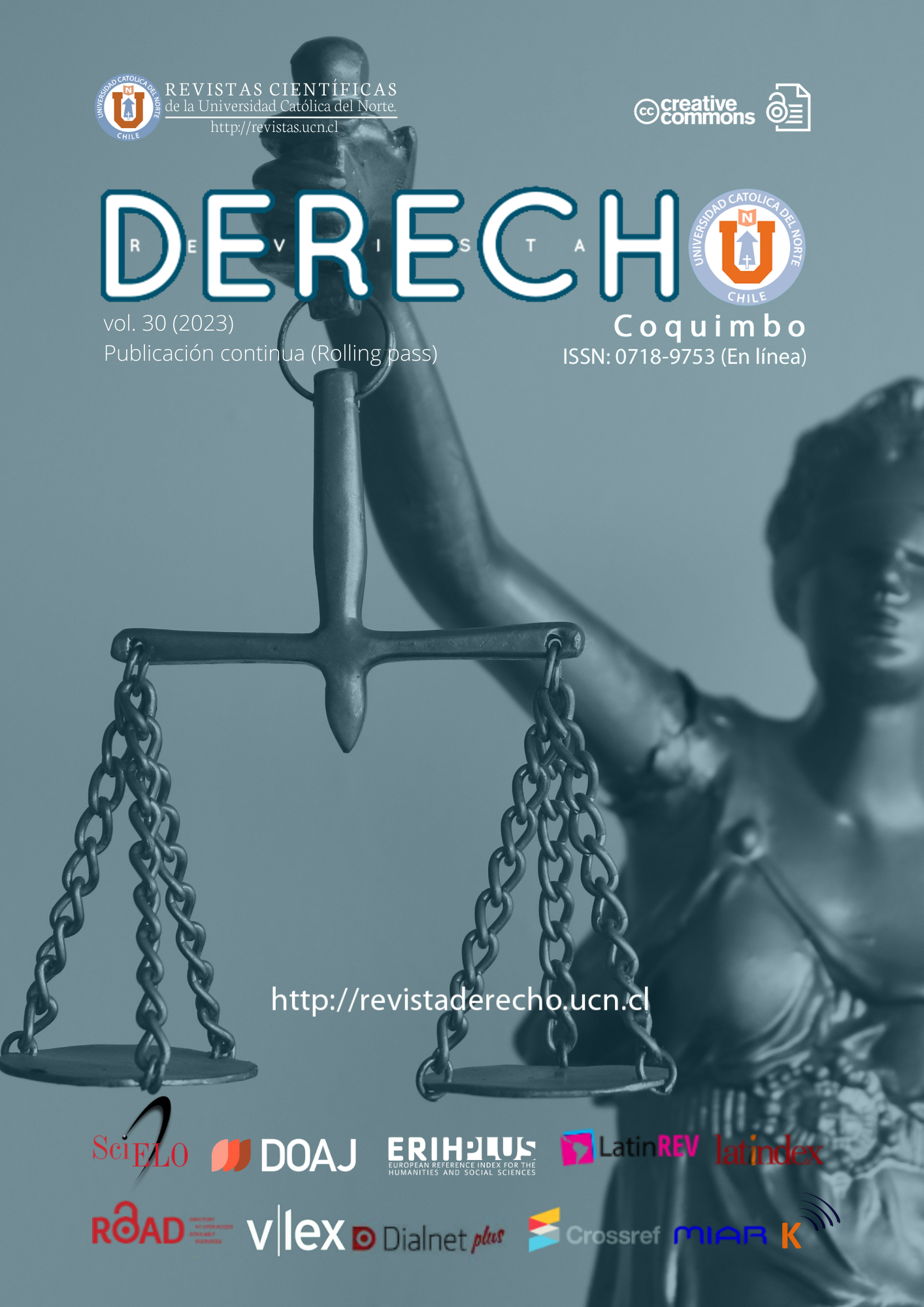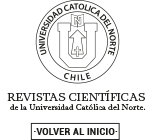The implicit sociology in the pure theory of law
DOI:
https://doi.org/10.22199/issn.0718-9753-4408Keywords:
Hans Kelsen, legal positivism, sociology of law, basic normAbstract
An attempt is made to establish the place of sociological analysis within the scheme of Kelsen’s pure theory. In this respect, it is argued that the proposal of an exclusively normative approach to law rests on a set of empirical conditions, on the verification of which the very possibility of assuming the Grundnorm of a system depends. Thus, when it comes to identifying something as law, it becomes necessary to examine the overarching relationship between validity and efficacy. But this can only be done by including knowledge beyond the legal science, that is, of a political and sociological nature. Correspondingly, this paper begins by presenting the ontological split between Sein and Sollen adopted by Kelsen as the basis for his methodological distinction between empirical and normative sciences. Then, this distinction is questioned from the perspective of the requirement of efficacy imposed on the validity of law, so as to finally arrive to the work’s conclusion. That is, that the pure theory presupposes a certain sociology in order to determine its own subject of study.
References
Bobbio, N. (1989). Kelsen y Max Weber. En Ó. Correas (Comp.), El otro Kelsen (pp. 55-77). Universidad Nacional Autónoma de México. https://bit.ly/43SDCNa
Bulygin, E. (2005). El Concepto de Eficacia. En H. Kelsen, E. Bulygin y R. Walter Validez y Eficacia del Derecho (pp. 23-49). Astrea.
Carson, H. (1917). The Trial of Animals and Insects. A Little Known Chapter of Mediæval Jurisprudence. Proceedings of the American Philosophical Society, 56, 410-415. https://bit.ly/3KhnGgu
Fariñas Dulce, M. J. (1988). Tensión y distinción entre la Sociología del Derecho y la Dogmática jurídica en la obra de Max Weber: un problema metodológico. Anuario de Filosofía del Derecho, 5, 195-224. https://bit.ly/3KharfG
García-Salmones, M. (2011). On Kelsen’s Sein: an approach to Kelsenian sociological themes. No foundations: journal of extreme legal positivism, (8), pp. 41-70. https://bit.ly/3OcfeAf
Gianformaggio, L. (1994). Estudios sobre Kelsen. Fontamara.
Holmes, O. W. (1897). The Path of the Law. Harvard Law Review, 10(8), pp. 457-478. https://doi.org/10.2307/1322028
Hume, D. (1997). Investigaciones sobre el conocimiento humano. Alianza.
Jellinek, G. (2000). Teoría General del Estado. Fondo de Cultura Económica. https://bit.ly/3KgPMbF
Kelsen, H. (1943). Society and Nature. The University of Chicago.
Kelsen, H. (1974). Causalidad e imputación. Boletín Mexicano de Derecho Comparado, (19), 207-232. https://bit.ly/3q4GZTf
Kelsen, H. (1982). Teoría Pura del Derecho (R. J. Vernengo, Trad.) (2a ed.). Universidad Nacional Autónoma de México. https://bit.ly/3rKgS4q
Kelsen, H. (1987). Problemas Capitales de la Teoría Jurídica del Estado. Porrúa.
Kelsen, H. (1992a). Compendio de Teoría General del Estado. Colofón.
Kelsen, H. (1992b). Una Fundamentación de la Sociología del Derecho. Doxa (Alicante), (12), 213-56, https://doi.org/10.14198/DOXA1992.12.07
Kelsen, H. (1995). Teoría General del Derecho y el Estado. Universidad Nacional Autónoma de México. https://bit.ly/3Oba1sj
Kelsen, H. (2005). Validez y Eficacia del Derecho. Astrea.
Lagi, S. (2007). El pensamiento político de Hans Kelsen (1911-1920). Biblioteca Nueva.
Martín Armengol, R.A. (2012) Norma fundamental y poder político. Politeia, 35(48), 251-72. https://bit.ly/3rNgrGw
Moore, G. E. (1993). Principia Ethica (2a ed.). Cambridge University.
Navarro, P. E. (2005). Presentación. En H. Kelsen, Validez y Eficacia del Derecho (pp. 1-8). Astrea.
Nino, C. (1999). Some Confusions sorrounding Kelsen’s Concept of Validity. En S. Paulson (Ed.), Normativity and Norms: Critical Perspectives on Kelsenian Themes (pp. 254-261). Oxford University. https://doi.org/10.1093/acprof:oso/9780198763154.003.0013
Paulson, S. (1992). The Neo-Kantian Dimension of Kelsen’s Pure Theory of Law. Oxford Journal of Legal Studies, 12(3), 311–332. https://doi.org/10.1093/ojls/12.3.311
Rivero Santana, E. (1991) Golpe de Estado y Revolución: Una aproximación al Fenómeno del Cambio en el Derecho. Thēmis (Lima), (20), 21-41. https://bit.ly/3q7VUMu
Robles Morchón, G. (1976) La polémica entre Kelsen y Ehrlich en torno a la naturaleza de la Ciencia Jurídica. Anuario de Filosofía del Derecho, (19), 183-198. https://bit.ly/451LdK7
Segura Ortega, M. (1993). El movimiento del Derecho libre. Anuario de Filosofía del Derecho, (10), 423-456. https://bit.ly/43MBAxG
Timasheff, N. (1961). La teoría sociológica (F. M. Torner, Trad.). Fondo de Cultura Económica. https://bit.ly/43JHmAs
Treves, R. (1984). Sociología del Derecho y Sociología de la Justicia en el Pensamiento de Hans Kelsen. Cuadernos de la Facultad de Derecho, (8), 99-116. https://bit.ly/3OyvDjL
van Klink, B. y Lembcke O. (2016). Exploring the boundaries of law: On the Is-Ought distinction in Jellinek and Kelsen. En S. Taekema, B. van Klink, and W. de Been (Eds.), Facts and Norms in Law (pp. 201-23). Edward Elgar. https://doi.org/kpvj
Walter, R. (2005). Eficacia y Validez. En H. Kelsen, Validez y Eficacia del Derecho (pp. 9-22). Astrea.
Weber, M. (1964). Economía y sociedad. Fondo de Cultura Económica.
Published
How to Cite
Issue
Section
Copyright (c) 2023 Hernán Gómez Yuri

This work is licensed under a Creative Commons Attribution 4.0 International License.
Aquellos autores/as que tengan publicaciones con esta revista, aceptan los términos siguientes:
- Los autores/as conservarán sus derechos de autor y garantizarán a la revista el derecho de primera publicación de su obra, el cuál estará simultáneamente sujeto a la Licencia de reconocimiento de Creative Commons que permite a terceros compartir la obra siempre que se indique su autor y su primera publicación esta revista.
- Los autores/as podrán adoptar otros acuerdos de licencia no exclusiva de distribución de la versión de la obra publicada (p. ej.: depositarla en un archivo telemático institucional o publicarla en un volumen monográfico) siempre que se indique la publicación inicial en esta revista.
- Se permite y recomienda a los autores/as difundir su obra a través de Internet (p. ej.: en archivos telemáticos institucionales o en su página web) antes y durante el proceso de envío, lo cual puede producir intercambios interesantes y aumentar las citas de la obra publicada. (Véase El efecto del acceso abierto)





_(1).png)












